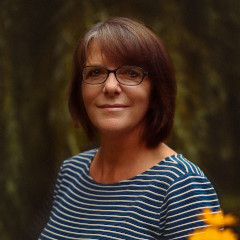Melanie Forster, Senior Lecturer in Psychology, Fellow (FHEA)/Chartered Consultant Clinical Psychologist and HCPC registered

email: melanie.forster
Our 60-second interview with Melanie:
Could you please tell us what work you do in the field of mental health?
Although I hold an academic post, I have worked for many years within child and adolescent mental health and family services in the NHS as a Consultant Clinical Psychologist, so the research I undertake has a qualitative methodology and is usually within an applied context. Recent examples include talking with parents of children with SEND and mental health difficulties, discussing with teachers their experiences of supporting the mental health of secondary school pupils, and interviewing women about the impact of journal writing in enhancing their emotional wellbeing.
I am interested in the lived experience of individuals, using semi-structured interviews to learn more about the personal journey and insights that can be obtained when you take part in an in-depth reflective conversation with someone. Through the process of thematic analysis, we can identify meaning and patterns within the narratives that help us better understand people’s experiences.
What do you find most rewarding and inspiring in this work?
It is such a privilege to hear the narratives of the participants who are willing to reflect upon their life experiences and share their thoughts and perceptions linked to these. Its great to be able to introduce students to such a valuable qualitative methodology that provides us with such a rich and meaningful understanding of issues and factors that impact upon an individuals’ journey through life.
What is the most challenging or complicated aspect of this work?
Perhaps the fact that qualitative methodologies are still often under-represented and therefore their value in enhancing knowledge and promoting a better understanding of the human condition isn’t always recognised.
What impact do you hope your work is having - or can potentially have?
Many of the individuals we talk with share how beneficial it is to take part in a qualitative interview; they feel listened to, empowered by the experience, a chance for their voice to be heard and their life experiences recognised. In this way, we are enriching the evidence-base through an applied understanding, our knowledge being directly shaped by the voices of those who are willing to share their own unique story.
Could you share with us one piece of advice that you follow for your own mental health?
Having grown up by the coast, walking by the sea and being out in nature generally always helps lift my mood and blows away any tension and stress. So even if I am feeling tired or busy, I know that making myself take a break and venturing outside will be good for my wellbeing.